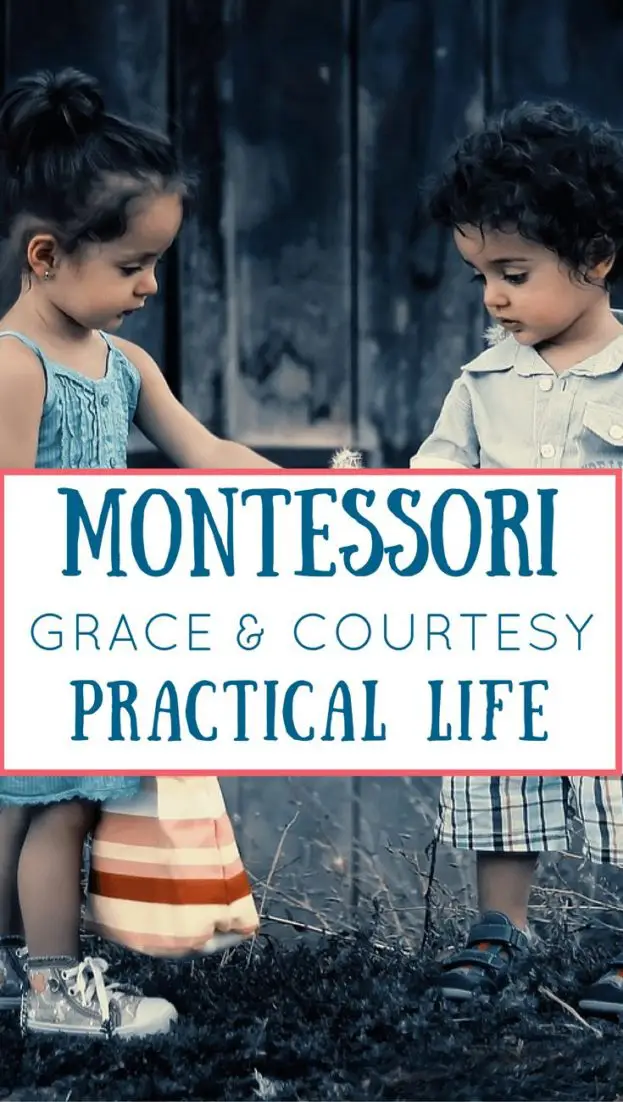Grace and courtesy are an integral part of the Montessori curriculum beginning in the early childhood classroom and continuing through the elementary levels.
In the Montessori Method, Dr. Maria Montessori stated, “Considering the method as a whole, we must begin our work by preparing the child for the forms of social life, and we must attract his attention to these forms”.
Lessons that help children learn these social strategies are taught so they can navigate friendships and collaborations with others that can benefit them throughout their life.

Montessori Grace & Courtesy
Grace and Courtesy in Montessori Early Childhood Classroom
Grace and courtesy lessons in Montessori are given as a group as a role-play. Each lesson isolates the positive behavior the teacher wishes to model.
During the lesson, there are five steps. First, the specific behavior is identified and defined. Then, there is a preview of what the children will happen. Next, children observe a role-play of the lesson.
There is then a debriefing about what the children saw and observed. Finally, guided role play allows the children to repeat the lesson. The following are examples of lessons given.
- Accepting or declining an invitation
- Accepting help
- Asking permission
- Excusing oneself
- Greeting or saying goodbye to another person
- Helping a classmate
- Inviting a classmate
- Observing lessons
- Refusing help
- Requesting privacy
- Speaking in a low voice
- Waiting for help
- Serving snack
Related Read: Montessori Theory: More On Practical Life
Grace and Courtesy in Montessori Elementary Classroom
Grace and courtesy lessons continue in the elementary environment, but the format changes from guided role play to group problem-solving and community meetings. Because the students have entered the second plane of development, they are able to process situations differently.
Small meetings between classmates or larger community meetings help students navigate social situations. During these groups, students learn the role of civil discourse, allowing one person to speak at a time. Students discuss situations, and they offer solutions. Students continually evaluate these solutions until there is one that works for everyone.
These lessons are incredibly important for children to learn, as they provide a solid foundation on how to navigate through their lives. Although children may encounter a lack of grace and courtesy in everyday life, in the Montessori classroom, the lessons they receive will help them be kind and compassionate members of society.
Dr. Montessori believed that children are hope and promise for mankind (Education and Peace). Grace and courtesy lessons are the origins of this belief.
Montessori Grace and Courtesy Quotes
Grace and courtesy are essential elements of the Montessori method, which emphasizes respectful and considerate interactions among children and between children and adults. Here are some Montessori grace and courtesy quotes that highlight the importance of fostering these qualities in young learners:
- “Grace and courtesy are among the first lessons in human relationships that we give to the child. These are, in their simplest form, the manners of everyday life.” – Maria Montessori
- “Averting one’s gaze, folding one’s hands, and saying ‘Excuse me’—these are trifles, yet trifles that are signs of a great culture.” – Maria Montessori
- “Let us give the child a vision of the whole universe… for all things are part of the universe, and are connected with each other to form one whole unity.” – Maria Montessori
- “We should try to offer the child what is necessary for his development, and that is something we cannot do if we do not know what functions his energies serve.” – Maria Montessori
- “Courtesy is the gift of treating others with warmth and respect, making them feel comfortable and valued in our presence.” – Unknown
- “Politeness is not just about knowing the right words to say but having a genuine care for others’ feelings and treating them with kindness and consideration.” – Unknown
- “The essence of manners is to make others feel at ease, respected, and appreciated.” – Unknown
- “In the education of a child, the acquisition of grace and courtesy is even more important than the fundamentals of reading, writing, and arithmetic.” – Maria Montessori
- “When we teach children about grace and courtesy, we are nurturing the foundation of a harmonious and compassionate society.” – Unknown
- “We must respect the child’s personality and personal dignity, preparing them to live in a society that values kindness and empathy.” – Maria Montessori
These quotes emphasize the importance of teaching children not only academic knowledge but also the essential values of respect, empathy, and kindness toward others, which are integral to a peaceful and cooperative community.
